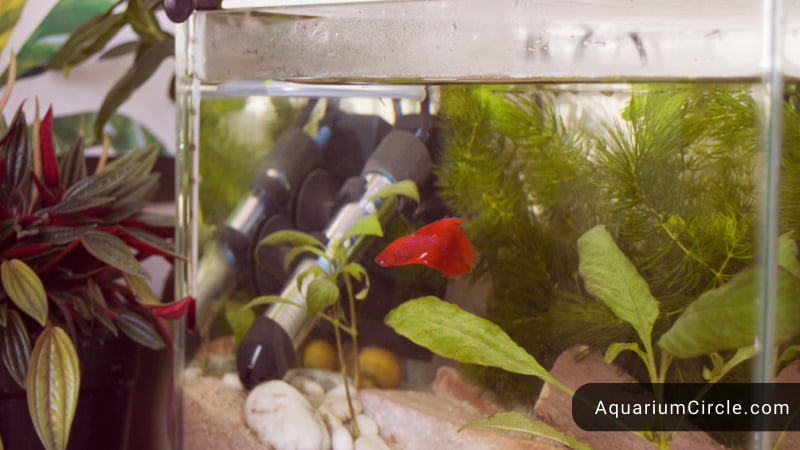Betta fish are beautiful and fascinating creatures that have become increasingly popular as pets. These colorful fish are known for their long, flowing fins, and they are often kept in small bowls or jars due to their size. However, the truth is that betta fish require more space than most people realize. When it comes to betta fish tank size, the minimum tank size for a betta fish is 2.5 gallons, but an optimal tank size of 5 gallons or more is recommended. Providing an appropriate betta fish tank size is crucial for their health and well-being, and it can help them live a long and happy life.
In this article, we will explore the importance of betta fish tank size, provide guidelines for choosing the best betta fish tank size, and discuss the benefits of an appropriate tank size for your betta fish. We will also address common misconceptions about betta fish tank size and highlight the mistakes to avoid when setting up a tank for your betta fish. By the end of this article, you will have everything you need to give your betta fish the best possible environment to thrive.
See also
- How Many Betta Fish In A 10 Gallon Tank: Useful Guide
- Top 3 Most Crucial Things To Know Before Getting A Multiple Betta Fish Tank
- Betta Fish Full Moon: Ultimate Care To Expand The Lifespan
Do Betta Fish Need A Large Tank To Swim?
Betta fish don’t need a large room to swim, but they do require enough space to move around comfortably. While they are small fish, they are active swimmers and need plenty of room to exercise and explore their environment. While they are small fish, they are territorial and need enough space to establish their territory without feeling cramped or stressed. In smaller tanks, betta fish can become lethargic and may suffer from poor physical and mental health.
A larger tank provides more swimming space, which can help reduce stress and promote better physical and mental health for the fish. Additionally, a larger tank allows for better water quality management, which is crucial for the overall health of betta fish.
Providing an appropriate tank size, along with appropriate filtration and environmental enrichment, can keep your betta happy and healthy.
What Is The Minimum Tank Size For Betta Fish?
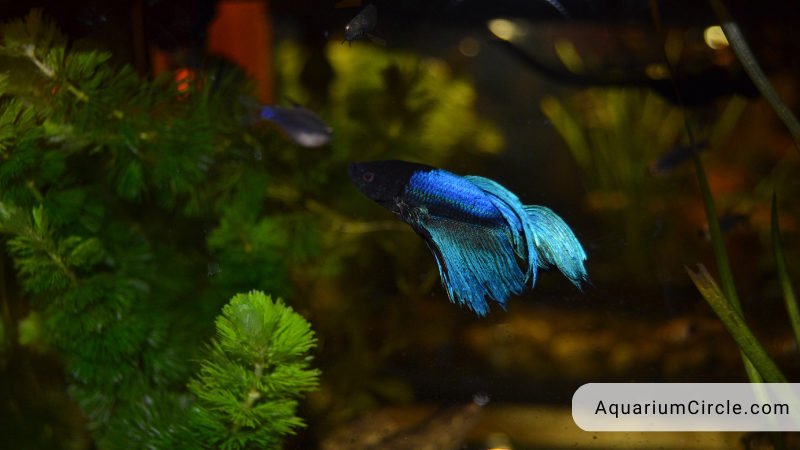
The minimum size for betta fish tank is 2.5 gallons. It is recommended to provide a minimum of 2.5 gallons of water per betta fish to allow for proper filtration and stable water conditions.
But, the bigger your tank is, the happier your fish will be. A larger tank provides more swimming space, which allows betta fish to swim around and explore their environment. It also reduces stress by preventing overcrowding and providing more hiding spaces and resting areas for the fish. A larger tank also provides better water quality management, as it allows for more filtration and reduces the frequency of water changes.
How Big Should A Betta Fish Tank Size Be? (Optimal Betta Tank Size)
The optimal tank size for betta fish is at least 5 gallons or more. And as mentioned above, while a 2.5-gallon tank is adequate, a larger tank size provides more swimming space and allows for better water quality management. Betta fish are active swimmers and require enough space to swim around and explore their environment. A larger tank size also reduces stress by providing more hiding places and resting areas for the fish. It also promotes natural behavior and reduces the likelihood of aggressive behavior.
A larger tank size provides better water quality management as it allows for more filtration and reduces the frequency of water changes. A larger volume of water can dilute waste and toxins, reducing the need for frequent water changes. It also provides more surface area for beneficial bacteria to grow, which helps to break down ammonia and nitrite and maintain stable water conditions.
In addition to tank size, other factors to consider when providing a suitable environment for betta fish include water quality, filtration, temperature, and environmental enrichment. Betta fish require clean, warm water with a consistent temperature between 76°F and 82°F. It is important to use a filter in the tank to remove waste and debris and perform regular water changes to maintain optimal water quality.
Environmental enrichment is also essential for the overall health and well-being of betta fish. Adding live plants, decorations, and hiding places can provide a more natural and engaging environment for the fish. It also helps to prevent boredom and promotes healthy behavior.
Factors That Affect Choosing The Best Tank Size For A Betta Fish
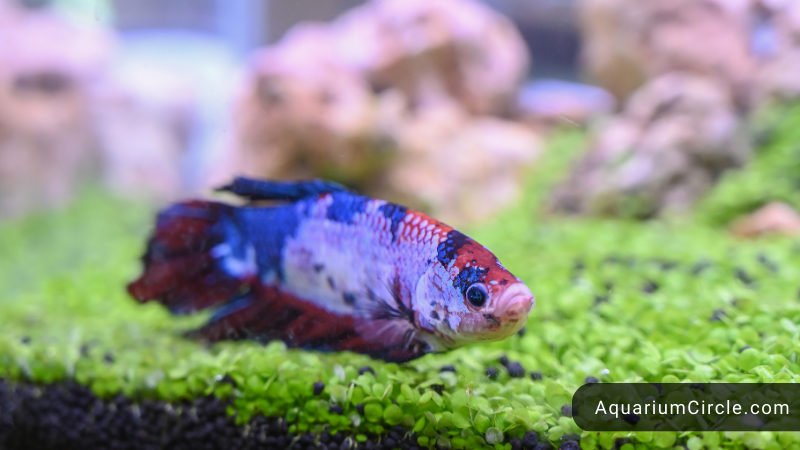
Choosing the best tank size for a betta fish requires careful consideration of several factors. Betta fish are small, active swimmers that require sufficient space to swim and explore. They can grow up to 3 inches in length, so it is essential to choose a tank size that can accommodate their size and swimming needs. Inadequate space can lead to stress, which can weaken their immune system and make them more susceptible to illness.
Betta fish require an enriched environment that includes live plants, hiding places, and decorations. These features provide the fish with a more natural and engaging environment, which promotes healthy behavior and prevents boredom. An enriched environment also helps to reduce stress and improve the overall health of the fish.
The size of the tank can affect the frequency of water changes required to maintain optimal water quality. A smaller tank may require more frequent water changes to prevent the buildup of toxins and waste, while a larger tank may require less frequent water changes due to the dilution of waste and toxins. Water changes are essential to maintain good water quality and prevent the buildup of harmful toxins that can make the fish sick.
Temperature stability is also crucial for betta fish, and larger tanks are easier to maintain a consistent temperature. Smaller tanks can experience rapid temperature fluctuations, which can be stressful for the fish and increase the risk of illness. A stable temperature is necessary to ensure that the fish’s metabolic processes function correctly and maintain their overall health.
In addition to the above factors, filtration is another critical consideration when choosing a tank size for betta fish. A larger tank allows for more filtration options, such as a larger filter or multiple filters, which can help to maintain better water quality. Filters help to remove waste and debris, promote the growth of beneficial bacteria, and provide oxygenation to the water.
Budget is also an important consideration when choosing a tank size for a betta fish. Larger tanks can be more expensive, especially when factoring in the cost of equipment and maintenance. However, larger tanks provide a more suitable environment for the fish and require less frequent maintenance, making them a more cost-effective long-term option.
Finally, the aesthetic appeal of the tank is also essential to consider. A larger tank provides more space for decoration and aquascaping, allowing for more creative and visually appealing designs. The right tank size can enhance the overall look and feel of the tank, making it a more enjoyable experience for both the fish and the owner.
See also: Do Betta Fish Like Light? Your Answer Is Right In This Post!
Advantages Of Choosing Appropriate Size Tank For A Betta Fish
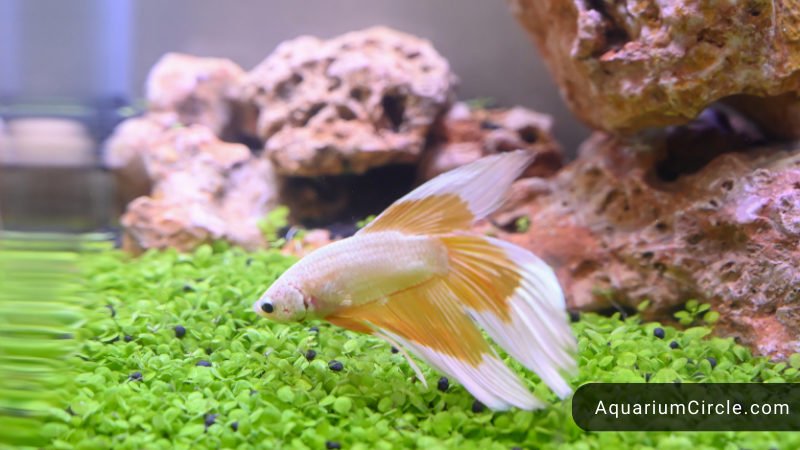
Choosing an appropriate size tank for a betta fish has many advantages, both for the fish and the owner. Here are some of the benefits of choosing the right tank size for a betta fish:
- Improved Health: Betta fish require enough space to swim and explore. Choosing an appropriate size tank provides the fish with enough room to swim and maintain good health. A suitable tank size also reduces stress, which can weaken the immune system and make the fish more susceptible to illness.
- Better Water Quality: The size of the tank can affect the frequency of water changes required to maintain good water quality. Choosing an appropriate tank size reduces the risk of water toxicity and waste buildup, which can harm the fish. A larger tank also allows for better filtration options, which helps to remove waste and debris and promote the growth of beneficial bacteria.
- Enriched Environment: Betta fish require an enriched environment that includes hiding places, decorations, and live plants. An appropriate size tank provides enough space to add these features, which provides the fish with a more natural and engaging environment. An enriched environment helps to reduce stress, promote healthy behavior, and prevent boredom.
- Lower Maintenance: Choosing an appropriate size tank reduces the frequency of water changes and maintenance required. A larger tank requires less frequent water changes, and filters can be more effective in maintaining water quality. A suitable tank size can also help to reduce the risk of equipment failure and the need for costly repairs or replacements.
- Aesthetic Appeal: A larger tank provides more space for decoration and aquascaping, allowing for more creative and visually appealing designs. The right tank size can enhance the overall look and feel of the tank, making it a more enjoyable experience for both the fish and the owner.
Betta Fish Tank Size Errors To Advoid
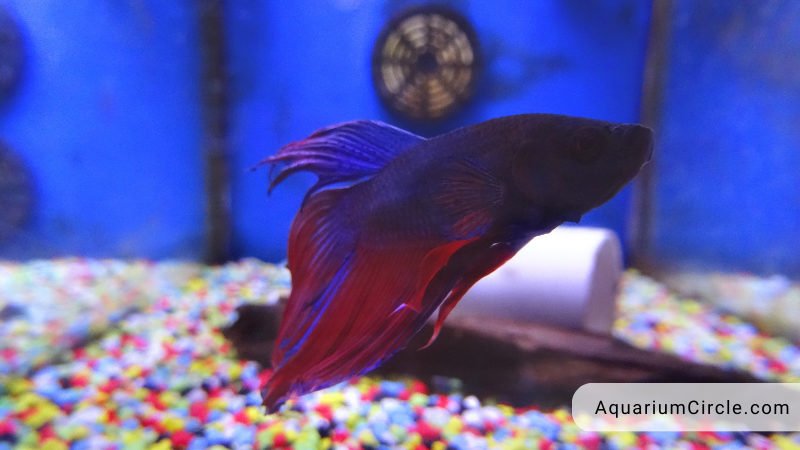
Choosing the right tank size for your betta fish is crucial for their health and well-being. However, there are several common mistakes that people make when selecting the ideal tank size. Here are some of the betta fish tank size mistakes to avoid:
- Choosing a Tank that is Too Small: One of the biggest mistakes people make is choosing a tank that is too small. Betta fish need space to swim and explore, and a tank that is too small can lead to stress, aggression, and poor health. A 2.5 gallons tank is recommended, but a 5-gallon tank or larger is even better.
- Ignoring the Tank Shape: Betta fish are known for their beautiful and flowing fins, and they need a tank that allows them to move around freely without getting caught on decorations or plants. Tall and narrow tanks may look appealing, but they can limit the fish’s ability to swim horizontally. A wider tank is a better choice for betta fish.
- Overcrowding the Tank: Adding too many fish or decorations to the tank can make betta fish feel cramped and overwhelming. Overcrowding can lead to poor water quality and aggressive behavior. It’s important to provide enough space for the betta fish to swim and add decorations sparingly.
- Neglecting Filtration and Water Changes: A larger tank may require less frequent water changes, but it’s still essential to maintain good water quality through proper filtration and regular water changes. Neglecting these maintenance tasks can lead to toxic water conditions that harm the fish.
- Not Considering the Fish’s Personality: Many Betta fish have different personalities and behaviors. Some are more active and require more space to swim, while others are more relaxed and may be content with a smaller tank. It’s important to consider your betta fish’s personality when selecting a tank size.
In conclusion, avoiding these betta fish tank size mistakes is essential for providing a healthy and suitable environment for your betta fish. By selecting an appropriate tank size, considering the fish’s personality, and maintaining good water quality, you can provide a comfortable and stimulating home for your betta fish.
See also: Guppy Fish With Betta: The Best Way To Get Your Aquarium Started
Video About Betta Fish Tank Size
FAQs
Is 1 gallon enough for a betta?
No, 1 gallon is not enough for a betta. The minimum tank size for a betta fish is 2.5 gallons, and it is recommended to 5-gallon tank or more for a single betta fish. A 1-gallon tank is too small for a betta to swim and thrive in.
Do betta fish prefer small or big tanks?
Betta fish prefer big tanks. While they can survive in small tanks, they thrive in larger tanks with ample swimming space. A larger tank provides betta fish with a more natural environment, reduces stress, and allows for better water quality. Therefore, it is recommended to provide a bigger tank for betta fish if possible.
Do betta fish get lonely?
Betta fish do not get lonely in the traditional sense. They are solitary and territorial fish, and they do not need the company of other bettas or other fish. However, they can get stressed in small tanks or cramped spaces, which can affect their health and well-being.
References

Annette M. Chaney is an experienced marine biologist with over 20 years of experience as an aquarist and fishkeeper. She started her first aquarium at a young age, filling it with frogs and goldfish obtained from the ten-cent pet store.
Annette grew up caring for and breeding African Cichlids, which led to a hobby in high school that doubled as a profitable means. Attending Reed College gave her time to solidify herself as an accomplished aquarium caretaker with an eye for sales. After that, from 2009 – 2013, she studied at Roger Williams University – one of the most prestigious universities for Aquaculture and Aquarium in USA. She is the founder of AquariumCircle since 2010.
